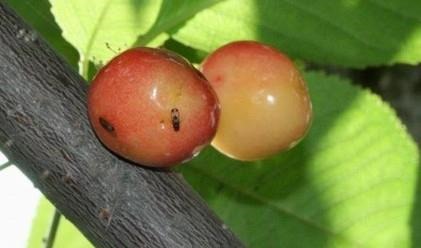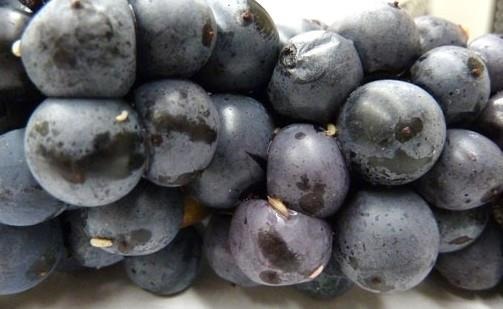By Ben Faber
A recent paper shows that a food-grade coating can successfully reduce the damage of cherry fruit fly on cherries. This has implications for control of olive fruit fly, spotted-wing drosophila (on blueberry and other bush berries), Mediterranean fruit fly and other tephritid flies. Read on:
Evaluation of Organic, Food-Grade Hydrophobic Coatings for Suppressing Oviposition and Increasing Mortality of Western Cherry Fruit Fly (Diptera: Tephritidae)
Abstract
To reduce risks and concerns of extensive insecticide use for controlling tephritid fruit flies, non or less toxic organic management options to the use of insecticides alone for fly control are needed . One such option is the use of physical or chemical barriers sprayed on fruit to protect fruit from fly attack. Surround wettable powder (kaolin) is the major organic barrier that has been developed that protects fruit (against sunburn) and deters insects. However, Surround has not been adopted to any large extent by growers for use against fruit flies due in part to the white residue it forms on fruit. A product that protects fruit while leaving no visible residue on fruit surfaces might be more acceptable for use.
Recently, the product HydroShield (original formulation; Cuticle Supplement), a nonwax organic food-grade hydrophobic coating that simulates plant cuticles, was developed that protects cherries from water-induced cracking . Unlike Surround, HydroShield forms an invisible (to human eyes) coating on cherries. HydroShield incidentally also helps protect fruit against attack by insects, specifically Drosophila suzukii (Matsumura) (Diptera: Drosophilidae), reducing oviposition by this fly in Sweetheart cherries.
Newer organic options for protecting fruit from tephritid fruit fly attack are needed to reduce extensive insecticide use. Here, we evaluated organic, food-grade hydrophobic coatings that help protect sweet cherries (Prunus avium L.) from water-induced cracking for suppressing attack on cherries by western cherry fruit fly, Rhagoletis indifferens Curran (Diptera: Tephtitidae), as well as for their effects on fly mortality. Three formulations of coatings called HydroShield 13.20, 13.22, and 13.28 that form invisible elastic barriers on cherries and that consist of complex carbohydrates, fatty acids and occlusive agents, solvents, emulsifiers, emollients, surfactants, and other ingredients were tested. In the laboratory, fly visits on and oviposition in HydroShield-coated cherries were 66.1–92.8% and 59.1–99.5% lower, respectively, than in controls. The mean number of dead female flies exposed to HydroShield-coated cherries was 69.4–94.6% greater than of females exposed to control cherries. In the field, three sprays of HydroShield 13.22 and 13.20 on sweet cherry trees in 2020, when fly densities were high, reduced larval infestations in cherries by 32.1% and 31.8%, respectively. In the field in 2021, when fly densities were lower, three sprays of HydroShield 13.22 and 13.28 reduced infestations in cherries by 90.5% and 86.8%, respectively, but sprays also reduced cherry size and toughened cherries. HydroShield formulations show promise in protecting sweet cherry from attack by R. indifferens, but further testing is needed to improve formulations so that they suppress fly oviposition without affecting cherry quality.

Adult drosophila laying eggs

Maggots doing their thing on blueberry
Source : ucanr.edu